Why should women change their names on getting married?
- Published
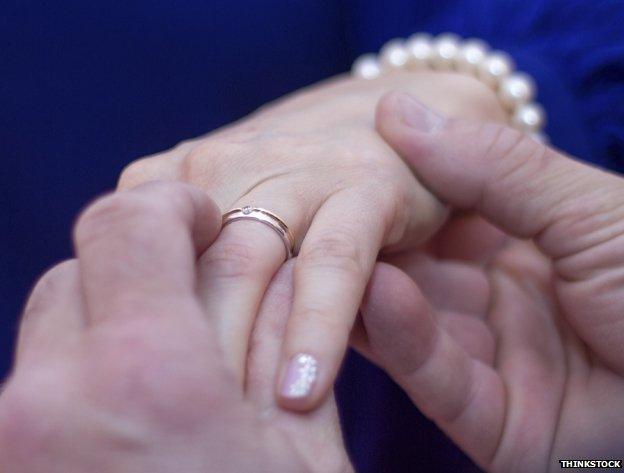
It is regarded as tradition for wives to take a man's name after marriage. Why, asks Dr Sophie Coulombeau.
My name is Sophie Coulombeau. But a year from now, after the fuss from my wedding has died down, it could be something rather different. For me, to adopt the surname of my partner and relinquish my own would profoundly affect how I think about my own identity.
On the one hand, it would bind us into a family unit and make it easier to know what to write on the birth certificates if we ever have children. But on the other, it would make me first and foremost a wife, while my husband would remain, quite simply, himself. Introducing myself as "Sophie Hardiman" would mean that saying "I do" had fundamentally changed the answer to the question "Who am I?"
If I chose to take my new husband's name, I'd be far from alone. A Eurobarometer survey, conducted in 1994, suggested that 94% of British women took their husbands' names when they got married. Recent smaller-scale research, however, suggests that this proportion has shrunk over the last two decades, especially among highly-educated and younger women. In 2013, academic Dr Rachel Thwaites found that 75% of respondents took their husband's names. Just last month, the Discourses of Marriage Research Group, a multi-institutional network interested in marriage equality, found that 54% of female respondents did the same.
Since in Britain it has always been legal to call yourself whatever you like (as long as you're not committing fraud), it's hard to get a clear and definitive picture. But as a rough guide we can estimate that when the confetti has fallen, two-thirds to three-quarters of married British women still sign documents using their husband's surname or introduce themselves using it - they apply for new passports and credit cards, or they change their handles on social media.
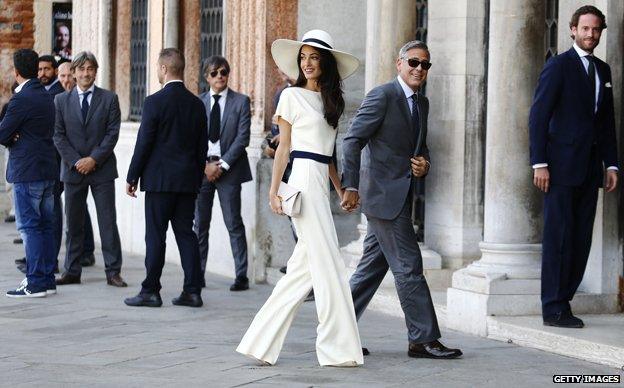
Feelings can run high over the issue of surname change, as demonstrated by recent criticism of Amal Alamuddin's decision to change her name when she married George Clooney. Some feminists point out that women suffer serious detriment to their careers when they change their names - that they signal their submission to their husbands, and reinforce to their own children the idea that women are inferior to men.
Others shrug the issue off and say that women's names mean little to them, or point out that a birth name is usually the name of the woman's father anyway. Those who think a woman should change her surname often say that it's not really important, but, given the choice between the various options, they prefer to go with "tradition".
This argument, of course, presupposes that traditions are worth preserving. But in fact, just a brief dip into the history of marital surname change - a specifically English phenomenon - reveals that its origins are at best controversial. And at worst, they are deeply unsavoury.
British hereditary surnames are only about 1,000 years old. Imported by the French around the time of the Norman Conquest, they stabilised throughout much of English society by the 14th Century, with Celtic regions taking longer to adapt. Married women, however, were perceived to have no surname at all, since the Normans had also brought with them the doctrine of coverture, the legal principle that, upon marriage, a woman became her husband's possession. Her state of namelessness reflected this. In the words of one court in 1340, "when a woman took a husband, she lost every surname except 'wife of'".
But, around the turn of the 15th Century, the French doctrine of coverture received a unique English twist. There was another interpretation of coverture available, based on scriptural ideas, which focused not on the husband's power over his wife but on the unity that marriage gave them.
In the words of the English jurist Henry de Bracton, they became "a single person, because they are one flesh and one blood". As this idea gained ground, so did the clerical habit of designating a married woman by her husband's surname. The married woman had formerly been a vassal with no surname at all, but now, in theory, she came to share the surname of her husband as a symbol of their legal and spiritual unity.
However, if there was one person in a marriage, that person was the husband. Married women still could not hold property, vote, or go to law. Legally, at the point of marriage they ceased to exist.
By the early 17th Century, the custom of the woman adopting her husband's surname was sufficiently entrenched in England that the antiquarian William Camden could write: "Women with us, at their marriage, do change their surnames, and pass into their husbands names, and justly. For they are no more twain, but one flesh."
Crucially, the custom was also specific to England. Camden noted with disapproval: "And yet in France and the Netherlands, the better sort of women will still retain their own name with their husbands… But I fear husbands will not like this note, for that some of their dames may be ambitiously over-pert and too forward to imitate it."

William Camden 1551-1623
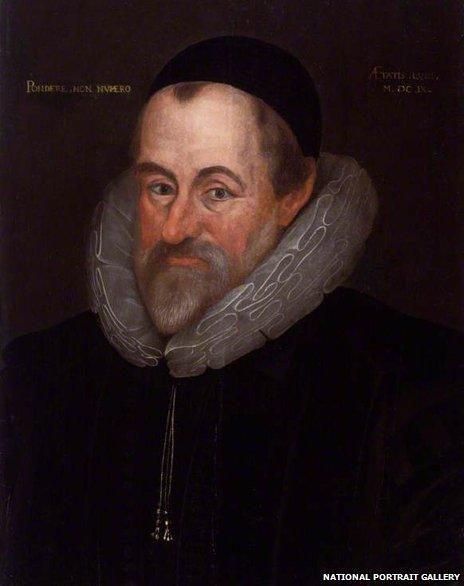
An important antiquary and historian
Employed at Westminster School, becoming its headmaster in 1593
During his vacations he made tours around England, collecting antiquarian material for his books, including Britannia, first published in 1586

So even in 1605, Camden identified a woman's desire to retain her own name on marriage with "ambition", "pertness" and "forwardness". Perhaps this was because he saw the surname as an especially important component of the name. Surnames were, he declared, "especially respected as whereon the glory and credit of men is grounded, and by which the same is conveyed to the knowledge of posterity".
By the middle of the 18th Century, as print culture expanded and literacy increased, some of those most preoccupied with "glory", "credit" and "posterity" were wealthy, powerful or famous married women who resented that their names would die with them. In Mary Wortley Montagu's words, women desired "that Fame which Men have engross'd to themselves and will not suffer us to share".
The pioneering feminist writer Mary Wollstonecraft, for example, married her fellow philosopher William Godwin in 1797. Immediately after their marriage, however, she still signed herself "MARY WOLLSTONECRAFT femme [or wife of] Godwin" - perhaps reflecting uneasiness at some of the implications of her new wedded state.

Mary Wollstonecraft 1759-1797
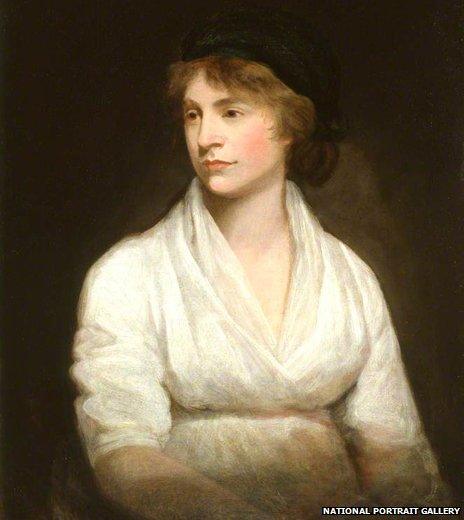
Author of A Vindication of the Rights of Woman (1792)
An affair with Gilbert Imlay produced a daughter - Fanny Imlay
Later married political writer William Godwin
Died at the age of 38, only 10 days after giving birth to second daughter, Mary Wollstonecraft Godwin (later Mary Shelley)

More conservative 18th Century women might have hesitated to take such a radical step - Camden's accusations of "ambition" and "forwardness" were still damaging, and to sign a different surname to one's husband or children could suggest that one was living in sin, causing immense reputational damage. But in many cases these women found other ways to perpetuate their own surnames, thus cheating the companion tradition that had arisen from that of the wife taking her husband's surname - that of the children inheriting the paternal surname too.
Hester Piozzi, one of the most influential literary women of the late 18th Century, petitioned the king to allow her husband's nephew to adopt her maiden name of Salusbury, and thus continue it to posterity. The fact that he had taken her maiden name, she wrote - even though she herself had abandoned that name on her marriage - made him "my Son at last - in true Earnest; my Son by Adoption, inserted into the Pedigree of my Descent".
Other women would do the same, or even petition Parliament to pass a private act ensuring the continuation of their maiden names. This vogue for women keeping or perpetuating their surnames was deeply controversial. The novelist Frances Burney plotted her second novel, Cecilia: Or, Memoirs of an Heiress, to revolve around the problem of a man who had to take a woman's surname. Burney's novel ignited impassioned debates in drawing-rooms all around literary London, with the Duchess of Portland declaring that "nothing, the nearest our own Hearts, could have been debated more warmly".
But the royal licence and the private act of parliament were solutions for only a few very wealthy English women. As the 19th Century dawned, the majority continued to take their husband's surnames and see their own die out. Over the Victorian period, however, several English women braved fierce criticism to obtain landmark court decisions that confirmed their right to call themselves the name they chose. Florence Fenwick Miller won the right to be elected to her school board under her maiden name in 1877, and two of the first married women to stand for Parliament, Mary Macarthur and Violet Markham, did so under their maiden names. Often they still had to deal with ignorant officials who maintained that it was the law for women to take their husband's names. But the barriers came slowly down, and in 1924 Helena Normanton, the first female barrister in England, succeeded in getting the British Foreign Office to issue her a passport in her maiden name.
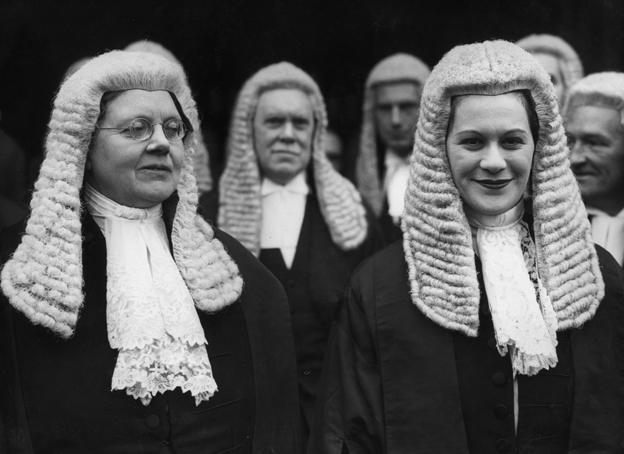
Helena Normanton (L) and Rose Heilbron (R)
One of the first things Normanton did after receiving her passport was travel to the USA to mentor a group of women who were fighting for a similar right. For the custom of marital surname change had taken on a global life. Over the 19th Century it had spread to Scotland, Ireland and Wales, as well as overseas to British colonies and ex-colonies, and to parts of mainland Europe. As the legal restrictions of coverture were gradually abolished, its symbol lived on - and in some other countries, it became law.
The battle for the maiden name was particularly fierce in the USA. Lucy Stone, a 19th Century US suffragist and abolitionist, was inspired by African-American customs to keep her maiden name after her marriage, signing her correspondence "Lucy Stone (only)." She faced challenge from legal officials who wouldn't let her buy land without signing her husband's name, which inspired her to seek legal assurance that there was, in fact, no law in existence that dictated she must do so. When this was confirmed, Stone made a public announcement that her name had not changed and never would. Her fellow activist Elizabeth Cady Stanton wrote, "Nothing has been done in the woman's rights movement for some time that has so rejoiced my heart as the announcement by you of a woman's right to her name. It does seem to me a proper self-respect demands that every woman may have some name by which she may be known from cradle to grave."

Lucy Stone 1818-1893
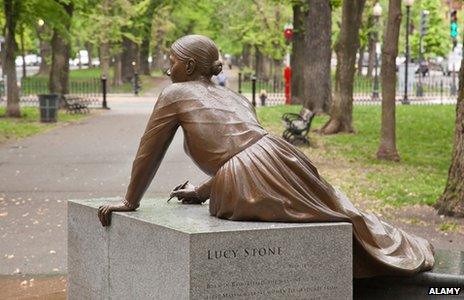
American pioneer of women's rights
Retained her own name in 1855 when she married Ohio abolitionist Henry B Blackwell
In 1866 she helped found the American Equal Rights Association
Formed the American Woman Suffrage Association in 1869

In 1921, Stone's example inspired the journalist Ruth Hale to found the Lucy Stone League, an American organization supporting women's rights to keep and use their maiden names. Mentored by Helena Normanton, and open to both women and men, the 'Lucy Stoners' challenged in federal court any government edict that would not recognise a married woman by the name she chose to use. Their slogan was "My name is my identity and must not be lost." During the 1920s they succeeded in getting real estate deeds, passports, bank accounts and voter registrations issued in the names that they chose.
But various US states countered their success by passing new laws compelling women to take their husbands' surnames. One attorney-general told a women who wished to keep her name that she was "an oddball", a "sick and confused woman", whose need was "not for a change of name but a competent psychiatrist". It was only in 1972 that a succession of legal cases confirmed that women could use their maiden names in whatever ways they pleased.
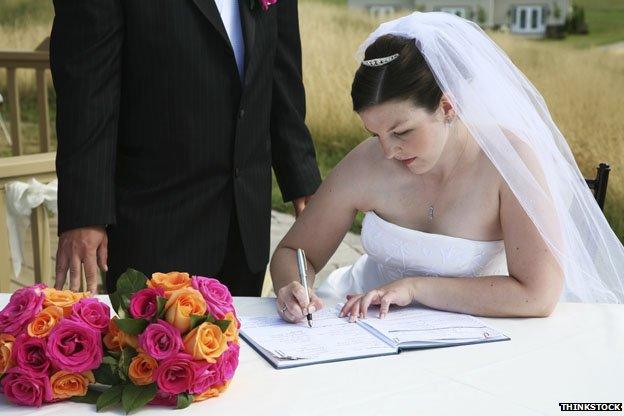
Some would say that the fight is now over. Both in the UK and the US, the restrictive provisions of coverture have long been abolished and women are, at least in law, equal to their husbands. They can now make a free choice about what to do with their names - and some couples are turning to double-barrelling or even hybrid names as a compromise. Yet in Britain, the US, and many other countries that adopted this originally niche English custom, the debate rages on. Despite the protests of some people that the surname question is unimportant, it still rakes up strong feelings like few other issues. And we might well ask, in the wake of last year's Marriage (Same Sex Couples) Act, whether a custom that depends on a gender-normative idea of marriage - a woman automatically sacrificing her name to take that of a man - is starting to look more outdated than ever.
I believe that every woman must make this choice for herself, and that it is important not to let a respectful debate become hijacked by judgmental accusations about who is, and is not, a true feminist. Having said that, I don't live free of history, and I can't bring myself to ignore it. If I look at the bureaucratic form that would enable me to change my name, I see the medieval script, "she has lost all surname but wife of". I see the royal licences bought by aristocratic women desperate to transmit their names to posterity. I see the legal judgment of the US attorney-general upon the "sick and confused woman… in need of a psychiatrist", and I see the signature of "Lucy Stone (only)."
When it comes to my own wedding day I will be "ambitious", "pert" and "forward". To abandon my surname and take that of my partner would mean abandoning Sophie Coulombeau, along with all the errors, achievements and resonances she created over thirty years. I would become, first and foremost, my husband's wife. And that's not the whole of me. So I will keep the name Coulombeau. I'll keep it with all its baggage, its embarrassments, its frequent misspellings, and its bad jokes about detectives. And as I sign my unchanged name in the register, I'll think of the women who made it possible for me to do so.
Listen to Is Marriage an Identity Crisis? on BBC Radio 3 on Wednesday 5 November at 22.45 GMT or catch up afterwards on BBC iPlayer.
Subscribe to the BBC News Magazine's email newsletter to get articles sent to your inbox.